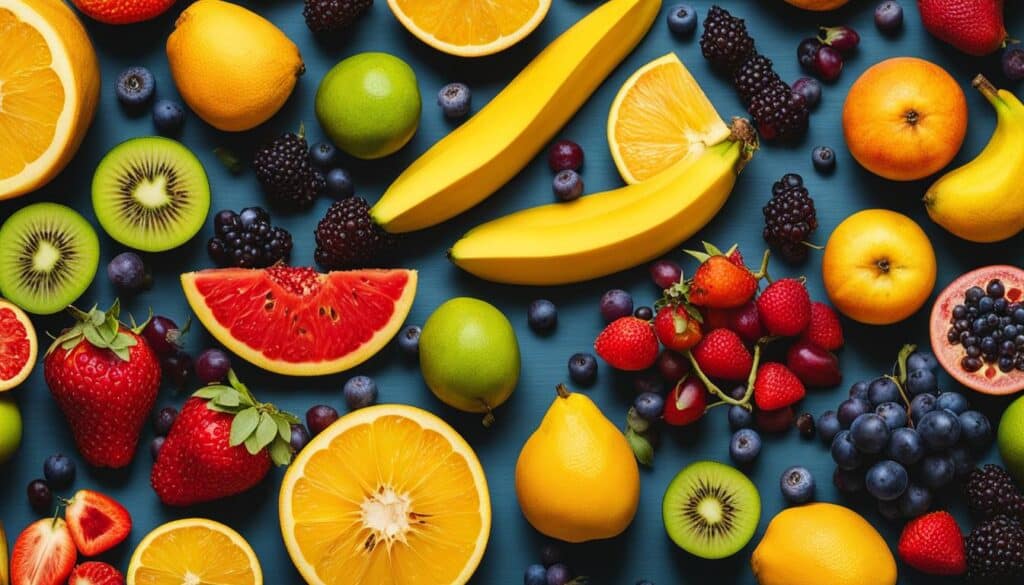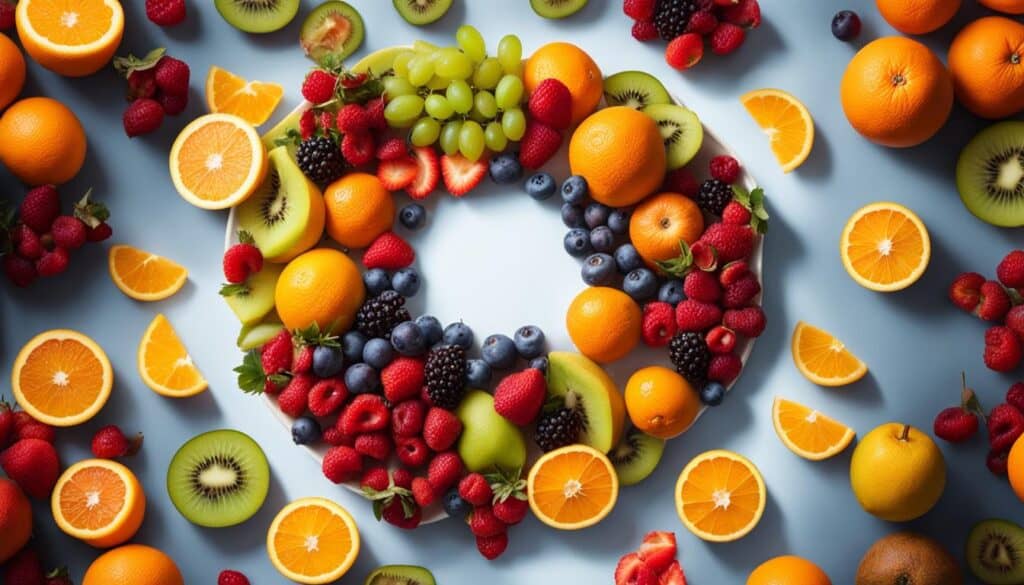Eating fruit is not only delicious but also provides numerous health benefits. However, have you ever wondered when is the best time to consume fruits for optimal health? In this article, I will unravel the truth and guide you on the timing for eating fruits that can reap the maximum benefits for your well-being.
Many experts agree that the best time to eat fruits is in the morning on an empty stomach. This is because our body’s metabolism is high during this time, allowing for quicker absorption of nutrients from the fruits. Additionally, fruits are rich in antioxidants, which help fight infections and reduce inflammation, making them an excellent choice to kickstart your day.
It is also advisable to consume fruits before and after a workout for maximum energy and electrolyte replenishment. However, it is important to avoid eating fruits at night or right before bed as they can raise blood sugar levels and potentially disrupt sleep. For individuals with diabetes, it is recommended to keep a gap of two hours between consuming fruits and meals to prevent spikes in blood sugar levels.
Another essential factor to consider is consuming fruits with their skin intact and opting for seasonal fruits whenever possible. Fruits with their skin intact provide additional fiber and nutrients, while seasonal fruits are fresher, more flavorful, and nutrient-dense.
Key Takeaways:
- Eating fruits on an empty stomach in the morning allows for quick absorption of nutrients.
- Consume fruits before and after a workout to maximize energy and electrolyte replenishment.
- Avoid eating fruits at night or before bed to prevent disruptions in sleep.
- Diabetic individuals should keep a gap of two hours between consuming fruits and meals.
- Enjoy fruits with their skin intact and prioritize seasonal fruits for maximum nutrition.
Debunking Common Myths About Fruit Eating
There are many misconceptions surrounding fruit consumption that need to be debunked. Let’s address some of the most common myths about eating fruits.
- Myth: Eating fruit with meals aids digestion.
Fact: Contrary to popular belief, there is no need to eat fruit with meals for proper digestion. The stomach is designed to prevent bacterial growth, and the body is capable of extracting nutrients from fruits regardless of when they are consumed.
- Myth: Eating fruits on an empty stomach changes their nutritional value.
Fact: The nutritional value of fruits remains unchanged whether they are eaten on an empty stomach or with a meal. The stomach and small intestine are efficient at absorbing nutrients, so the timing of fruit consumption does not affect their nutrient content.
- Myth: Eating fruit separately improves digestion for individuals with diabetes.
Fact: Eating fruit separately from meals does not necessarily improve digestion for individuals with diabetes. In fact, it can cause a slower release of food into the small intestine, leading to a smaller rise in blood sugar levels. It is important for individuals with diabetes to work with their healthcare provider to determine the best timing and portion sizes for fruit consumption.
- Myth: Consuming fruits in the morning is more beneficial than at other times of the day.
Fact: There is no scientific evidence to suggest that consuming fruits in the morning is more beneficial than at other times of the day. The key is to incorporate fruits into your daily diet consistently, regardless of the time of consumption.
“The key to debunking fruit-eating myths is to rely on scientific evidence and work with healthcare professionals to make informed decisions about fruit consumption.”
Debunking Common Myths About Fruit Eating
It is important to separate fact from fiction when it comes to fruit eating. By debunking these common myths, we can make informed decisions about our fruit consumption and enjoy the numerous health benefits that fruits provide.
| Myth | Fact |
|---|---|
| Eating fruit with meals aids digestion. | There is no need to eat fruit with meals for proper digestion. |
| Eating fruits on an empty stomach changes their nutritional value. | The nutritional value of fruits remains unchanged regardless of when they are consumed. |
| Eating fruit separately improves digestion for individuals with diabetes. | Eating fruit separately does not necessarily improve digestion for individuals with diabetes. |
| Consuming fruits in the morning is more beneficial than at other times of the day. | There is no scientific evidence to suggest that consuming fruits in the morning is more beneficial. |
The Optimal Time to Enjoy Fruits & the Importance of Their Seasonality

When it comes to enjoying fruits, there is no one-size-fits-all answer to the optimal time. The best time to eat fruits depends on personal preference and lifestyle. Some individuals prefer to start their day with a refreshing fruit salad, while others enjoy a fruity snack in the afternoon or as a post-dinner treat. Nutritionists agree that fruits can be enjoyed at any time during the day, whether it’s in the morning, afternoon, or evening.
However, it is important to consider the seasonality of fruits when incorporating them into your diet. Eating seasonal fruits not only ensures that you are consuming fresher and more flavorful produce, but it also provides additional nutritional benefits. Fruits that are harvested during their peak season tend to be more nutrient-dense compared to those that are harvested out of season. For example, summer fruits like watermelon and berries are known for their high vitamin C content, which can help boost immunity during the hot months.
Seasonality also plays a role in the environmental impact of fruit consumption. By choosing fruits that are in season, you are supporting local farmers and reducing the carbon footprint associated with transporting out-of-season fruits. Additionally, seasonal fruits are more likely to be grown using sustainable farming practices, ensuring that you are making an eco-friendly choice.
The Benefits of Eating Seasonal Fruits:
- Enhanced flavor and freshness
- Higher nutritional value
- Support for local farmers
- Reduced environmental impact
- Opportunity to try new and unique varieties
Incorporating fruits into your daily diet, regardless of the time of day, is essential for overall health and well-being. Whether you prefer to enjoy them in the morning to kickstart your day or as a refreshing snack between meals, the key is to prioritize regular fruit consumption. By selecting seasonal varieties, you can maximize the nutritional benefits while also supporting local agriculture and protecting the environment.
But Is It Bad To Eat Fruits Before Going To Sleep?
Many people wonder if eating fruits before going to sleep has negative effects on their health. While there are a few considerations to keep in mind, it is not inherently bad to consume fruits before bedtime. In fact, certain fruits can even have sleep-regulating benefits.
One important factor to consider is the type of fruit you choose to eat. Fruits that are high in fiber or contain a significant amount of sugar should be avoided close to bedtime. These fruits can potentially disrupt digestion and lead to discomfort during sleep. However, there are fruits that can be beneficial before sleep.
Tart Montmorency cherries, for example, are a natural source of melatonin, a hormone that helps regulate sleep cycles. Consuming a small portion of these cherries before bed may contribute to better sleep quality and duration.
In addition, certain fruits like bananas can provide a good source of potassium, which may help prevent nighttime leg cramps. These fruits can be a healthy and nutritious option before bed.
| Fruit | Benefits Before Bedtime |
|---|---|
| Bananas | Rich in potassium, may prevent leg cramps |
| Tart Montmorency Cherries | Natural source of melatonin, aids in sleep regulation |
It’s important to note that individual responses to eating fruits before bed may vary. If you have diabetes or blood sugar concerns, it’s advisable to consult with a healthcare professional before consuming fruits right before bedtime, as it may potentially affect blood sugar levels.
Conclusion on Fruit Before Bed
While it’s not necessarily bad to eat fruits before going to sleep, it’s important to choose the right fruits and consider individual health conditions. Fruits like bananas and tart Montmorency cherries can have beneficial effects before bed, but it’s best to avoid high-fiber or high-sugar fruits close to bedtime. As with any dietary choices, it’s always best to listen to your body and make choices that work best for you.
Best Time to Eat Fruits for Optimal Health Benefits

Eating fruits at the right time can maximize the health benefits they provide. Incorporating fruits into your daily diet is essential for overall well-being. While there is no one-size-fits-all answer to the best time to eat fruits, here are some guidelines to consider:
- In the Morning: Starting the day with fruits on an empty stomach can provide a quick energy boost and promote better absorption of nutrients. Fruits like oranges and berries are great options for a refreshing morning snack.
- In Between Meals: Snacking on fruits between meals can help curb hunger, keep blood sugar levels steady, and provide essential vitamins and minerals. Opt for fruits like apples, grapes, and bananas during mid-morning or mid-afternoon snack breaks.
- Pre-Workout: Consuming fruits before a workout can provide a natural source of energy and aid in recovery. Bananas and dates are excellent choices due to their high carbohydrate content.
- As Dessert: If you have a sweet tooth, replacing traditional desserts with fruits can satisfy your cravings while providing valuable nutrients. Try grilled pineapple or a fruit salad after dinner.
Remember, the key is to enjoy a variety of fruits throughout the day to experience their diverse health benefits. Incorporating fruits into your daily diet ensures you receive essential vitamins, minerals, antioxidants, and fiber. Experiment with different fruits and find the timing that works best for you.
Benefits of Regular Fruit Consumption
Regular fruit consumption is associated with numerous health benefits. Fruits are packed with vitamins and minerals that support a strong immune system, healthy digestion, and optimal organ function. They also contain antioxidants that help protect against chronic diseases like heart disease and cancer. Furthermore, the fiber found in fruits aids in weight management, promotes healthy cholesterol levels, and regulates blood sugar. By incorporating fruits into your daily diet, you can improve your overall health and well-being.
Incorporating Fruits into Your Daily Diet
Adding fruits to your daily diet is easier than you might think. Here are some simple tips to help you incorporate more fruits into your meals and snacks:
- Keep a variety of fruits on hand for quick and convenient snacking.
- Add fruits to smoothies, yogurt, cereals, and salads for added flavor and nutrition.
- Replace sugary snacks with fresh fruits for a healthier alternative.
- Experiment with different fruit combinations to create new and exciting flavors.
- Visit local farmers’ markets to explore seasonal fruits and support local businesses.
By making fruits a regular part of your diet, you can enjoy their delicious taste and reap the numerous health benefits they provide. Start incorporating fruits into your meals and snacks today and experience the positive impact on your overall health and well-being.
Benefits of Eating Fruits on an Empty Stomach

I love starting my day with a bowl of fresh fruits on an empty stomach. Not only does it taste delicious, but it also provides numerous health benefits. Eating fruits on an empty stomach allows the body to absorb their nutrients more effectively. The high concentration of minerals, vitamins, and beneficial compounds in fruits promotes optimal absorption and utilization by the body. Plus, it helps in maintaining healthy digestion and preventing digestive issues.
One of the key advantages of eating fruits on an empty stomach is weight loss. Fruits are naturally low in calories and high in fiber, which keeps you full for longer and helps control calorie intake throughout the day. This can be especially beneficial for those looking to shed a few pounds or maintain a healthy weight. By filling up on fruits in the morning, you can start your day with a nutrient-rich, low-calorie meal that fuels your body without adding excess calories.
Another benefit of consuming fruits on an empty stomach is the regulation of blood sugar levels. Fruits generally have a low glycemic index, which means they release sugars into the bloodstream slowly, preventing sudden spikes in blood sugar levels. This is particularly important for individuals with diabetes or those who are concerned about maintaining steady blood sugar levels. Starting your day with fruits can provide a quick energy boost without causing a rapid rise in blood sugar levels.
Incorporating fruits into your daily diet on an empty stomach can have a significant impact on your overall health and well-being. From supporting digestion to aiding in weight loss and regulating blood sugar levels, fruits offer a multitude of benefits when consumed in the morning before other foods. So why not kickstart your day with a nutritious and delicious bowl of fruits? Your body will thank you!
Table: Nutritional Content of Common Fruits
| Fruit | Calories | Vitamin C (mg) | Potassium (mg) | Fiber (g) |
|---|---|---|---|---|
| Apple | 52 | 8.4 | 107 | 2.4 |
| Banana | 96 | 8.7 | 358 | 3.1 |
| Strawberries | 32 | 58.8 | 153 | 2.0 |
| Orange | 62 | 69.7 | 237 | 3.1 |
Whether you choose to enjoy a variety of fruits in a fruit salad or indulge in a single piece of fruit, eating fruits on an empty stomach is a surefire way to kickstart your day on a healthy note. So next time you’re feeling hungry in the morning, reach for a delicious piece of fruit and experience the wonderful benefits it brings. Your body will thank you for it!
Quotes:
“Starting the day with a bowl of fresh fruits on an empty stomach sets a positive tone for the rest of the day. It not only provides essential nutrients but also helps in maintaining healthy digestion and managing weight.”
“Eating fruits on an empty stomach is a simple habit that can have a big impact on your overall health. It’s a refreshing and nutritious way to start the day and keeps you feeling energized and satisfied.”
Benefits of Eating Fruits in Between Meals

Eating fruits in between meals offers numerous benefits for your health and overall well-being. Not only are fruits delicious and refreshing, but they also provide essential vitamins, minerals, and antioxidants that support optimal bodily functions. Snacking on fruits can be a great way to satisfy your cravings while nourishing your body with natural goodness.
One of the key advantages of snacking on fruits is that they are easily digestible. Unlike heavy and processed snacks, fruits are light on the stomach and provide a quick burst of energy. They are rich in natural sugars that can give you a much-needed pick-me-up throughout the day. Plus, fruits contain fiber, which helps keep you full for longer, reducing the chances of overeating during main meals.
Another benefit of eating fruits in between meals is that they contribute to maintaining steady blood sugar levels. Fruits have a low glycemic index, which means they release sugar into the bloodstream slowly and steadily, preventing energy crashes and sugar cravings. This makes fruits an excellent choice for a healthy snack, especially if you’re looking to manage your weight or control your blood sugar levels.
| Fruit | Taste | Nutritional Value |
|---|---|---|
| Strawberry | Sweet and tangy | High in vitamin C and antioxidants |
| Orange | Citrusy and refreshing | Rich in vitamin C and fiber |
| Apple | Crisp and slightly tart | Good source of fiber and vitamin C |
Furthermore, snacking on fruits can help you incorporate a wide variety of nutrients into your diet. Different fruits offer different health benefits, so by diversifying your fruit choices, you can ensure that you’re getting a range of essential nutrients. From vitamin C in strawberries to potassium in bananas, each fruit brings its own unique nutritional value to the table.
Incorporating fruits as snacks in between meals is a simple yet effective way to boost your fruit consumption and support a healthy lifestyle. Whether you prefer sliced fruits, fruit salads, or smoothies, there are plenty of delicious and nutritious options to choose from. So next time you feel the urge to indulge in a snack, reach for a juicy piece of fruit and enjoy the benefits it brings to your body and mind.
Enjoy the natural goodness of fruits
- Snacking on fruits provides essential vitamins, minerals, and antioxidants.
- Fruits are easily digestible and give a quick energy boost.
- They help maintain steady blood sugar levels and reduce sugar cravings.
- Including a variety of fruits in your snacks ensures a diverse range of nutrients.
“Let food be thy medicine and medicine be thy food.” – Hippocrates
Foods to Avoid Eating Fruits With
When it comes to optimizing digestion and getting the most out of your fruit consumption, it’s important to be mindful of what foods you combine with fruits. Certain foods can interfere with the digestion process, leading to discomfort and digestive issues. To ensure smooth digestion and maximize nutrient absorption, here are some best practices for fruit consumption:
Avoid combining fruits with heavy meals
Eating fruits immediately after a heavy meal can slow down digestion and cause bloating. It is recommended to wait for at least an hour or two after a meal before consuming fruits. This allows the body to properly break down and absorb the nutrients from the meal before moving on to digesting the fruits.
Separate high-fiber foods from fruits
Foods that are high in fiber, such as whole grains and legumes, can also slow down the digestion of fruits. To optimize digestion, it is best to consume high-fiber foods separately from fruits. This allows the body to efficiently digest each type of food and prevents the discomfort that can arise from combining them.
Avoid pairing fruits with foods high in fat and protein
Foods that are high in fat and protein, such as cheese, meat, and nuts, can also interfere with the digestion of fruits. These foods require different digestive enzymes and can cause indigestion when combined with fruits. It is recommended to eat fruits separately or as a snack between meals to ensure proper digestion.
| Foods to Avoid Eating with Fruits | Reasons to Avoid |
|---|---|
| Heavy meals | Slows down digestion and can cause bloating |
| High-fiber foods | Interferes with digestion and can cause discomfort |
| Foods high in fat and protein | Requires different digestive enzymes and can lead to indigestion |
By following these best practices, you can optimize digestion and ensure that you get the most out of your fruit consumption. Remember to listen to your body and pay attention to how different food combinations make you feel. Everyone’s digestive system is unique, so it’s important to find what works best for you.
Fruits to Include in Daily Diet for Maximum Nutrition
Incorporating a variety of fruits into your daily diet is essential for maximizing nutrition intake and supporting overall health. Here are some nutrition-packed fruits that you should consider including in your daily diet:
- Apples: Rich in vitamins C, E, and K, as well as fiber, apples provide numerous health benefits, including supporting heart health and aiding in digestion.
- Kiwis: Packed with vitamin C, kiwis are also a good source of dietary fiber and antioxidants, which can help boost the immune system and promote healthy skin.
- Strawberries: Known for their high vitamin C content, strawberries are also rich in antioxidants and fiber. They can support heart health, improve blood sugar regulation, and contribute to healthy weight management.
- Oranges: Famous for their vitamin C content, oranges also provide other essential nutrients like folate and potassium. They promote immune function, aid in collagen production, and support heart health.
- Watermelons: High in water content and rich in vitamins A and C, watermelons are a hydrating and refreshing fruit choice. They also provide lycopene, an antioxidant that has been linked to a reduced risk of certain cancers.
- Papayas: Loaded with vitamins C and E, papayas also contain an enzyme called papain, which aids in digestion. They can support skin health, enhance immune function, and promote healthy digestion.
- Bananas: A good source of potassium, bananas are known for their energy-boosting properties. They also provide essential vitamins B6 and B5, which support brain function and help convert food into energy.
By including these essential fruits in your daily diet, you can ensure a diverse range of nutrients that support your overall well-being. Remember to choose a variety of fruits to enjoy the full spectrum of health benefits they offer.
Fruit Nutrition Comparison Table
| Fruit | Vitamins | Minerals | Other Nutrients |
|---|---|---|---|
| Apples | Vitamin C, E, K | Fiber | Antioxidants |
| Kiwis | Vitamin C | Fiber | Antioxidants |
| Strawberries | Vitamin C | Fiber | Antioxidants |
| Oranges | Vitamin C, E | Folate, Potassium | Antioxidants |
| Watermelons | Vitamin A, C | Lycopene | Hydrating |
| Papayas | Vitamin C, E | Fiber | Papain |
| Bananas | Vitamin B6, B5 | Potassium | Energy-boosting |
The table above provides a comparison of the vitamins, minerals, and other nutrients found in these essential fruits. It showcases the diverse nutritional profiles that make them valuable additions to your daily diet.
Healthy Fruit Snack Recipes
Looking for easy and nutritious fruit snack ideas? Incorporating fruits into your snacks is a great way to satisfy your sweet tooth while enjoying the health benefits of these delicious treats. Whether you’re looking for a quick bite or a refreshing pick-me-up, these healthy fruit snack recipes are sure to hit the spot. Get ready to tantalize your taste buds and nourish your body with these easy-to-make fruit snacks.
1. Apple, Banana, and Date Salad
This simple yet satisfying fruit salad combines the natural sweetness of apples, bananas, and dates. To make this nutritious snack, slice one apple and one banana into bite-sized pieces, and pit and chop a handful of dates. Toss the fruits together in a bowl and sprinkle with a squeeze of lemon juice for an extra zing. This refreshing salad is packed with fiber, antioxidants, and essential vitamins, making it a perfect snack to enjoy any time of the day.
2. Pear and Pomegranate Salad
For a burst of flavors, try this vibrant pear and pomegranate salad. Start by slicing a ripe pear and removing the seeds from a pomegranate. In a bowl, mix the pear slices and pomegranate seeds together. Drizzle with a spoonful of honey and sprinkle some chopped mint leaves for added freshness. This delightful combination of juicy pear and tangy pomegranate is not only delicious but also rich in fiber, vitamin C, and antioxidants.
3. Apple Banana Steel-Cut Oats
If you’re in the mood for a heartier snack, try this satisfying apple banana steel-cut oats recipe. Cook a serving of steel-cut oats according to the package instructions. Once cooked, stir in some diced apples and sliced bananas. Sprinkle with a pinch of cinnamon and a drizzle of maple syrup for extra flavor. This warm and comforting snack is packed with fiber, vitamins, and minerals, making it a great option for a quick and filling snack.
| Fruit Snack | Ingredients | Benefits |
|---|---|---|
| Apple, Banana, and Date Salad | Apple, banana, dates, lemon juice | Fiber, antioxidants, vitamins |
| Pear and Pomegranate Salad | Pear, pomegranate, honey, mint leaves | Fiber, vitamin C, antioxidants |
| Apple Banana Steel-Cut Oats | Steel-cut oats, apple, banana, cinnamon, maple syrup | Fiber, vitamins, minerals |
These healthy fruit snack recipes offer a delightful way to incorporate more fruits into your daily diet. Whether you prefer a refreshing fruit salad or a warm oatmeal snack, these recipes provide a perfect balance of flavors and nutrients. Remember to choose fresh, seasonal fruits for the best taste and nutritional value. Enjoy these tasty creations and reap the many benefits that fruits have to offer!
Conclusion
After examining the optimal time to eat fruits for optimum health benefits, it is clear that there isn’t a one-size-fits-all approach. The best time to consume fruits varies for each individual and depends on personal preference and lifestyle. However, there are some general recommendations to keep in mind.
Eating fruits on an empty stomach in the morning can provide several benefits, including quick absorption of nutrients, detoxification, and weight loss. Consuming fruits in between meals is also beneficial as it helps to keep you full for longer and provides a burst of energy. It is important to avoid eating fruits before bed and wait for at least an hour or two after meals to allow for proper digestion.
It is recommended to include a variety of fruits in your daily diet to ensure a diverse range of nutrients. This will help you enjoy the maximum nutritional advantages that fruits have to offer. Remember, the key to a healthy diet is balance, moderation, and variety. Incorporate fruits into your routine in a way that suits your lifestyle and preferences, and enjoy the numerous health benefits they provide.
FAQ
Is it better to eat fruits on an empty stomach?
Yes, eating fruits on an empty stomach in the morning allows for quick absorption of nutrients and maximum benefits.
Should I eat fruits before or after a workout?
It is recommended to eat fruits both before and after a workout for maximum energy and electrolyte replenishment.
Can I eat fruits at night or before bed?
It is best to avoid eating fruits at night or right before bed, as they can raise blood sugar levels and disrupt sleep.
How long should I wait to eat fruits after a meal?
It is recommended to wait for at least an hour or two after eating a meal before consuming fruits to allow for proper digestion.
Should I eat fruits separately from meals for better digestion?
No, the stomach is designed to prevent bacterial growth, so it is not necessary to eat fruits separately from meals for proper digestion.
Does the timing of fruit consumption affect its nutritional value?
No, the body is capable of extracting nutrients from fruits regardless of when they are consumed.
Are there specific fruits that are better to eat in the morning?
Certain fruits like bananas and apples are ideal for a pre-workout snack or to kickstart your day due to their energy-boosting properties.
Can I eat fruits before going to sleep?
It is not inherently bad, but it is recommended to choose low-sugar fruits that are easy to digest, such as berries, apples, and pears, if craving something sweet at night.
What are the benefits of eating fruits on an empty stomach?
Eating fruits on an empty stomach aids in detoxification, weight loss, healthy digestion, and maintaining steady blood sugar levels.
What are the benefits of eating fruits in between meals?
Eating fruits in between meals provides a burst of energy, helps keep you full, maintains steady blood sugar levels, and provides essential vitamins, minerals, and antioxidants.
Are there any foods I should avoid eating fruits with?
It is best to avoid eating fruits with meals, high-fiber foods, or foods that can cause indigestion to ensure proper digestion.
Which fruits should I include in my daily diet for maximum nutrition?
Apples, kiwis, strawberries, oranges, watermelons, papayas, and bananas are some fruits packed with essential nutrients.
Can you provide any healthy fruit snack recipes?
Yes, some healthy fruit snack recipes include an apple, banana, and date salad, a pear and pomegranate salad, and apple banana steel-cut oats.





Leave a Reply